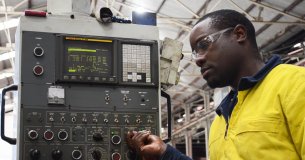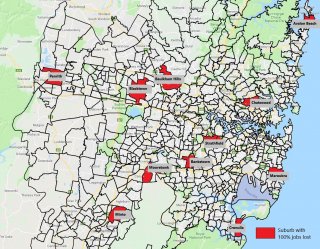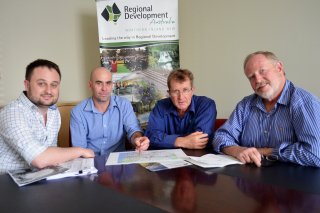-
Featured Items
-
Featured Resources
 Funding & Grants
Don't miss out on funding opportunities. Stay informed with our up to date online listings and email notifications.
Read More
Funding & Grants
Don't miss out on funding opportunities. Stay informed with our up to date online listings and email notifications.
Read More
 Skilled Migration
Our services help both applicants and employers, to learn more, develop plans, submit applications, and settle in.
Read More
Skilled Migration
Our services help both applicants and employers, to learn more, develop plans, submit applications, and settle in.
Read More
 Research and Analysis
Good research and analysis makes the case. How can our resources and services help your project or application?
Read More
Research and Analysis
Good research and analysis makes the case. How can our resources and services help your project or application?
Read More
 Information & Data Resources
With resources like REMPLAN, Regional Knowledge Base, and decades of data, discover how we can help your project.
Read More
Information & Data Resources
With resources like REMPLAN, Regional Knowledge Base, and decades of data, discover how we can help your project.
Read More
-
Stay InformedSubscribe to one or more of our regular email subscriptions, to be kept up to date on news and funding opportunities for the region
-
-
Our Region
- Our Region
- Regional Plan
- Regional Data
- Current Regional Issues
- Population Migration Analysis for 2016-21
- Job Vacancies Continue at All-Time High
- National Debt - What it Means for Our Economy?
- The True Value of Home Solar
- The Economic Impacts of Local Government Amalgamations
- State of the Regions Report 2014-15
- Antifragility - A different take on regional economic development
- Biohubs - Collaborative Waste Management
- Attracting New Residents
- Socio-Economic Impacts of the Murray Darling Basin Plan
- Murray Darling Basin Water Recovery
- Growing Businesses
- The Northern Inland Economy
- Geographical Overview
- Major Industry Sections
- Our Services
- Grants and Funding
-
Skilled Migration
- Skilled Migration
- Skilled Employer Sponsored Regional Visa
- Skilled Work Regional Visa (subclass 491)
- Temporary Seasonal Workers
- Designated Area Migration Agreement (DAMA)
- Helpful Information for Visa Holders
- Information for Employers
- Case Studies
- Payment Details
- Advice & Further Information
- Contact Details
- News & Events
-
Our Projects
- Our Projects
- Current Projects
- Skilled Migration
- Wool Works - Wool Training Schools
- Metal Works - Welding and Fabrication Schools
- Come On Inland
- Stories of Resilience
- Alt Brothers Beekeeping - Glen Innes
- Carelle's Toy Store - Glen Innes
- Greenhill Orchards - Arding
- Gwydir Meats - Warialda
- Kaputar Motors - Narrabri
- Moonbi General Store - Moonbi
- Sandstock - Tingha
- Sherelle Fashions - Tenterfield
- Sleepy Merino - Inverell
- Tenterfield Chamber of Toursim, Industry and Business - Tenterfeild
- The Welders Dog - Armidale
- Walcha Veterinary Supplies - Walcha
- AGCAP - Agribusiness Careers & Professions
- Northern Inland Regional Investment Profile
- Past Projects
- Digital Economy Strategy
- Business Growth Project
- Go Digital
- How to Start an Online Business
- Create Your Website Using Squarespace
- How to Edit Your Squarespace Site - Part 1
- How to Edit Your Squarespace Site Part 2
- Add a Shop to Your Squarespace Site
- Start a Blog and Find out What Customers are Searching
- 14 Tips For a Better Blog Post
- Which Social Media Platforms are Best for Your Business
- How to Use Facebook Effectively For Your Business – Part 1
- How to Use Facebook Effectively For Your Business – Part 2
- Instagram Tips for Business
- Catching Up, More Instagram & Dealing with Haters
- Getting Started with Twitter for Business
- Social Media Scheduling Tools
- How to Start an Etsy Shop – Part 1 – Research
- How to Start an Etsy Shop – Part 2 – Signup
- Online Security for Your Business
- Product Photography and Website Images: Your Guide
- 5 Tips to Improve your Productivity in your Business
- Best Online Business Resources
- How to Improve Your Communication Skills and Win More Clients
- NBN Coordinator
- Putting Power Back in the Regions
- Road Freight Study
- Town Audit Benchmarks
- Food and Wine
- Youth Survey
- Digital TV Switchover Assistance
- Northern Inland Transport Guide
- Live.Train.Work
- Northern Inland Innovation Awards
- Northern Inland Innovation Awards - 2017
- Northern Inland Innovation Awards - 2016
- Northern Inland Innovation Awards - 2015
- Northern Inland Innovation Awards - 2014
- Northern Inland Innovation Awards - 2013
- Northern Inland Innovation Awards - 2012
- Norther Inland Innovation Awards - 2011
- Prime Super Northern Inland Innovation Awards - 2010
- Prime Super Northern Inland Innovation Awards - 2009
- Northern Inland Innovation Awards - 2007
- Northern Lights Project
- NBN Smart Home
- Murray Darling Basin
- Moree Plains Business Workshops
- Namoi Investment Prospectus
- Industrial Land
- Bioenergy and Local Electricity Retailing
- Northern Inland Business Energy Assessment
- Skills for the Future
- Impacts of COVID-19 on Businesses
- Past Projects of NIRDB
- Aboriginal Employment and Enterprise in the Gunnedah Region
- Art as an Industry
- Aviation Survey
- Farm Forestry - Northern Inland Forestry Investment Group
- New England North West Film Strategy
- Northern Inland Excellence in Business Awards
- Food and Wine 2003 - 2008
- Prime Super Northern Inland Innovation Awards 2009
- Regional Business Networking Program
- Regional Leadership Course 2008
- Viticulture Strategy 2002-2003
- About Us
- Contact Us
- Other Resources
- Privacy and Legal
- Search
- News & EventsNews & Events
- NewslettersNewsletters
- NSW’ worst drought ever – Innovative insights for SydneyNSW’ worst drought…
Back to Newsletters
NSW’ worst drought ever – Innovative insights for Sydney
Wednesday 9th of October 2019
NSW’ worst drought ever – Innovative insights for Sydney
The numbers clearly show that the drought ravaging regional New South Wales is the worst since records began in the 19th century and it is past time that our city cousins and policy-makers understand the unfolding crisis, according to Russell Stewart, Chair of Regional Development Australia Northern Inland (RDANI).
“Our researchers have utilised innovative economic modelling to paint a clear picture of the economic, environmental and community impacts of the ongoing drought in Northern NSW,” he said. “They then overlayed that picture with one of Sydney to illustrate how the city would be suffering if the locales were reversed”.
“The economic impacts experienced in eastern Australia through extended drought conditions have been beyond the imagination of city residents, until now.”
Economic development specialists like RDANI, use the economic analysis and data tool REMPLAN for developing economic impact statements, business cases and other evidence-based projections. Senior RDANI Research Economist David Thompson has turned the REMPLAN tool on its head and used it to gauge the economic impact of the drought, producing shocking comparisons that can help our city cousins fully appreciate the challenging circumstances currently being faced by regional communities.
“REMPLAN can be used to measure the negative impacts of drought on a regional economy, though we have typically used it to measure the positive impacts of proposed investments. NSW Business Chamber surveys have indicated the drought in our region has reduced business’ turnover by as much as 33%. We modelled a 25% reduction in agricultural business turnover, which leads to 4,178 job losses across the Northern Inland NSW economy, Mr. Thompson said.
“To bring the picture into focus for those in the city, we were able to map the equivalent economic downturn, if it was to occur in Sydney. 4,178 jobs lost in our region is 5.8% of the workforce. The equivalent impact in Sydney would be 130,000 job losses, or 100% of jobs lost in each of the 11 suburbs shown in red on the map, namely Avalon Beach, Bankstown, Baulkham Hills, Blacktown, Chatswood, Cronulla, Maroubra, Minto, Moorebank, Penrith and Strathfield,” Mr. Thompson said.
Narrabri-based RDANI chair Russel Stewart, has called on Sydneysiders to better understand the catastrophic impact of the ongoing drought, not just for the farmers, but for each and every small business in our towns and cities that rely on the broader farming sector’s spending for their survival
“Our regional communities need economic stimulus. We need to see people escape the city, explore a region and spend a few dollars in our character-packed towns.”
Related Pages







 Latest News
Latest News


